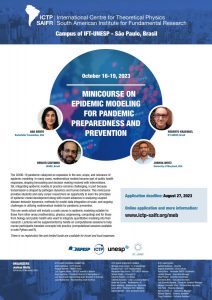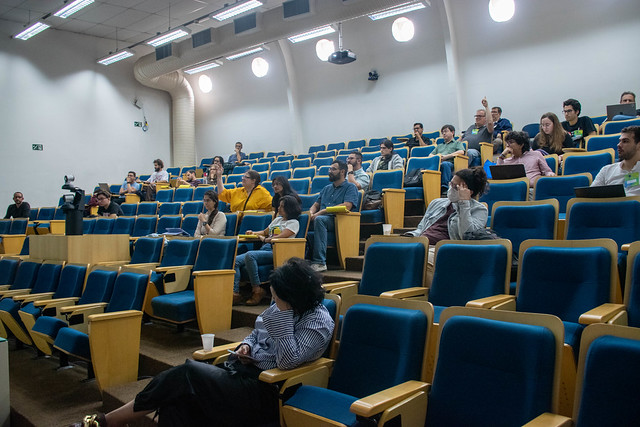Minicourse on Epidemic Modeling for Pandemic Preparedness and Prevention
October 16-19, 2023
São Paulo, Brazil
ICTP-SAIFR/IFT-UNESP


Home
The COVID-19 pandemic catalyzed an expansion in the size, scope, and relevance of epidemic modeling. In many cases, mathematical models became part of public health responses, shaping forecasting and decision making involved with interventions. Yet, integrating epidemic models in practice remains challenging, in part because transmission is shaped by pathogen dynamics and human behavior. This minicourse provides students and early career researchers an opportunity to learn the principles of epidemic model development along with recent advances in analyzing coupled disease-behavior dynamics, methods for model-data integration at scale, and ongoing challenges in utilizing mathematical models for pandemic prevention.
This one week school will include a crash course in epidemic modeling suitable for those from other areas (mathematics, physics, engineering, computing) and for those from biology and public health who want to integrate quantitative modeling into their research. Lectures will be supplemented by hands-on computational sessions to help course participants translate concepts into practice (computational sessions available in both Python and R).
There is no registration fee and limited funds are available for travel and local expenses.
Organizer:
- Joshua Weitz (University of Maryland, USA)
List of participants: Updated on November 16, 2023
Satisfaction Survey: HERE
Lecturers
Lecturers:
- Ana Bento (Rockefeller Foundation, USA) – Balancing disease and economic outcomes; and surveillance, information seeking, and preventing future pandemics.
- Renato Coutinho (UFABC, Brazil) – Transmissibility and reinfection of variants; and Modeling the impact of vaccination campaigns.
- Roberto Kraenkel (IFT-UNESP, Brazil) – Crash-course for epidemics; and Modeling an ongoing epidemic.
- Joshua Weitz (University of Maryland, USA) – Epidemic dynamics through the lens of COVID-19; Heterogeneity and its consequences; and Hands-On Modeling.
Registration
Program
Videos and Files
-
14:00 - Joshua Weitz (University of Maryland, USA):
Epidemic dynamics through the lens of COVID-19
-
16:00 - Roberto Kraenkel (IFT-UNESP, Brazil):
Crash-course for epidemics
-
10:30 - Renato Coutinho (UFABC, Brazil):
Transmissibility and reinfection of variants
-
14:00 - Ana Bento (Rockefeller Foundation, USA):
Balancing disease and economic outcomes
-
16:00 - Joshua Weitz (University of Maryland, USA):
Hands-On Modeling; Epidemic Basics
-
10:30 - Joshua S. Weitz (University of Maryland):
Model-driven Tools for Pandemic: Response & Prevention
- 14:00 - Joshua S. Weitz (University of Maryland): Ecological Dynamics and Therapeutic Impacts of Bacteriophage: a Not-So-Perfect Predator
-
16:00 - Joshua Weitz (University of Maryland, USA):
Hands-On Modeling; Stochastic Epidemics
-
10:30 - Joshua Weitz (University of Maryland, USA):
Heterogeneity and its consequences
-
14:00 - Roberto Kraenkel (IFT-UNESP, Brazil):
Modeling an ongoing epidemic
-
16:00 - Ana Bento (Rockefeller Foundation, USA):
Surveillance, information seeking, and preventing future pandemics
asdasdasd
Photos
Additional Information
BOARDING PASS: All participants, whose travel has been provided or will be reimbursed by ICTP-SAIFR, should bring the boarding pass upon registration. The return boarding pass (PDF, if online check-in, scan or picture, if physical) should be sent to secretary@ictp-saifr.org by e-mail.
COVID-19: Brazilians and foreigners no longer have to present proof of vaccination before entering the country.
Visa information: Nationals from several countries in Latin America and Europe are exempt from tourist visa. Nationals from Australia, Canada and USA are exempt from tourist visa until January 10, 2024. Please check here which nationals need a tourist visa to enter Brazil.
Accommodation: Participants, whose accommodation will be provided by the institute, will stay at The Universe Flat. Hotel recommendations are available here.
How to reach the Institute: The school will be held at ICTP South American Institute, located at IFT-UNESP, which is across the street from a major bus and subway terminal (Terminal Barra Funda). The address which is closer to the entrance of the IFT-UNESP building is R. Jornalista Aloysio Biondi, 120 – Barra Funda, São Paulo. The easiest way to reach us is by subway or bus, please find instructions here.

